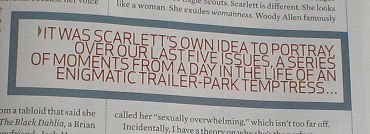Impact grenade, hot shrapnel, exploding black sand: MCN’s David Poland has just posted not one but two pans of Clint Eastwood’s Flags of Our Fathers and it’s fairly rough stuff. Not a disappointing film but a bad one, he says.
I was told after seeing Flags of Our Fathers last week that reviews most likely wouldn’t be “hitting the street” so to speak until next Monday, 10.16, so this took me aback. But the TV review that ran yesterday on Ebert and Roeper (Roeper gave it a thumbs-up, guest critic Zorianna Kitt was more mezzo-mezzo-neghead) blew that apart and suddenly the gates were down. Variety had been holding its review (said to be fairly positive) and will go out later today or tomorrow; ditto Hollywood Reporter.
“The good news is that even as I watched Flags of Our Fathers, I was craving Letters From Iwo Jima,” Poland writes at the end of one of his articles, referring to Eastwood’s Japanese Iwo Jima film that due in early February.
“My guess is that it will be a much, much better film because without the War Bond Tour as a focal point, it will have a clear focus,” he explains. “We, the Americans, are the villain. And death is the villain. And the villain will have a complete victory from their perspective. But the Eastwoodian element is that in that single focus, there will be honor and passion and faith√ɬ¢√¢‚Äö¬¨√Ǭ¶ things truly missing from all but the surface of Flags of Our Fathers.
“If I were Clint Eastwood, I would be pushing to qualify Letters From Iwo Jima because Flags of our Fathers is now a long-shot, at best, for a Best Picture [nomination]. It just isn’t the kind of work that speaks to Clint’s strengths.”
Emanuel Levy went with a rave review late last week. On the other hand, The Envelope‘s Tom O’Neil, obviously having called around, has run a piece asking if Flags of Our Fathers is this year’s Jarhead.
wired
Waterworld — the Comic Sequel
Man, is there a here-we-go-again feeling conveyed by Lorenza Munoz‘s prosecutorial L.A. Times article about monster cost overruns on Universal’s Evan Almighty or what?
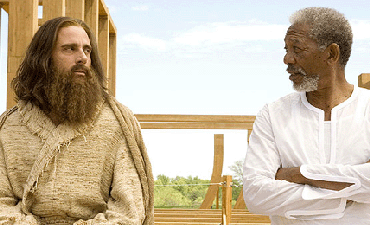
This Steve Carell–Morgan Freeman mega-laugher about “a Noah-like congressman commanded by God to hoard hundreds of animals into an ark the size of a cruise ship”, Munoz says, will “probably become the most expensive comedy ever” because of a total tab (including marketing) of $250 million . The title of the article sounds rote: “Budget Overruns of Biblical Proportions.” If you ask me, the title in people’s minds reading this piece all over town is much better: Choppy Seas for Waterworld: The Comic Sequel.
Articles of this sort are like the starting gun at an Olympic swimming meet. On your mark, get set…crack! Into the water and beat this sucker down for being too expensive! Pound it in pre-release pieces like bombers strafing a Japanese-held island during World War II…softening up the defenses, preparing for the Big Assault. Pay close attention to research screenings and play up the numbers if they’re at all negative, and when the legit reviews start to show up on Metacritic and Rotten Tomatoes everybody needs to always mention the budget, the budget, the budget.
I’m cynical about this process, having taken part in similar assault campaigns for the last 24 years or so. (One of my first big stories in this business was a piece about why Sydney Pollack‘s Tootsie had cost a shockingly expensive $21 million.) On the other hand I’m kind of against Evan Almighty from the get-go because money isn’t funny.
The bigger and more costly a film is, the less witty and nimble-footed it tends to be. All the best comedies are smallish, human-scaled, character-driven. When’s the last time you laughed at something epic-scaled with tens of millions of CG propping it up? Remember Wild Wild West?
On top of which I half-dislike slick-ass directors like Tom Shadyac on general principle. He’s a pro-level studio guy and you know the movie will look like and sound terrific, and his last God movie, Bruce Almighty, had its moments. And you have to tipyour hat to the guy who directed Ace Ventura Pet Detective, The Nutty Professor and Liar Liar, which were all very big adn pretty funny at times. But keep in mind also that Shadyac directed Patch Adams, which I hated.
My idea of a just-right, quirky-hip, first-rate comedy is Little Miss Sunshine, and I don’t think Shadyac could have directed that film and made it come out right with a gun at his head.
Final “Departed” numbers
My Sunday morning estimate was $25.8 million, but WB is saying Martin Scorsese‘s The Departed, showing on 3017 screens, finally ended up with just over $27 million…whatever. The reallly encouraging news is WB distrib chief Dan Fellman‘s claim that while Departed tracking had indicated its popularity would mainly be among older males, “we hit almost 25% in every quadrant.” My eyebrows went up slightly when I read that but fine, terrific…bodes well for the next three or four weekends.
Hughes’ pregnancy
16 year-old Keisha Castle-Hughes‘ announcement that she’s pregnant by her 19 year-old boyfriend and intends to give birth next year sounds vaguely creepy, yes. I don’t want to speculate how this may affect the reception to New Line’s The Nativity Story (opening 12.1), or if anyone will give a shit one way or the other.

But when you think about it and get beyond the young-girl-having-sex-in-her- early-teens angle, which is common behavior the world over, it’s not that strange.
Most younger people put off coming to grips with the heavy stuff until they’re 30 and sometimes older. This little girl is different. By the general standards of con- temporary western culture Ms. Hughes should be living a free and unencum- bered go-for-it lifestyle for the next 10 or 15 years before buckling down and shouldering the burdens of parenthood, but here she is getting right down to it with a child in her belly five years before her 21st birthday.
Unusual, to say the least. On one level I feel she’s making a mistake; on another she has my respect.
Pug Bus buttplug
Some of the items on Pug Bus are mildly funny. As good as some of the stuff of The Onion, only punchier. This Tom Cruise one isn’t bad; neither is this one on Courtney Love.
Anderson on “Man”
According to Variety reviewer John Anderson, “Robin Williams is not particularly funny” in Barry Levinson‘s Man of the Year (Universal, 10.13). “And, as if to compensate, Levinson and editors Steven Weisberg and Blair Daily cut to reaction shots each time [his character]cracks a joke.
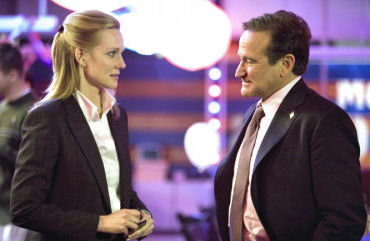
“Williams comes off too stiff for a performer who has achieved such widespread popularity. His lines aren’t particularly fresh or crisply delivered, and his manner is, well, mannered. Although much is made of his bachelorhood during the early campaign part of the pic so that one assumes he must be gay, later he falls for [costar Laura Linney‘s character] — which is the smartest thing he does in the movie.
“The best scenes are between Linney and Williams; she raises his game, and his often mawkish sincerity suddenly becomes perfectly natural.
“While there are many implausibilities in Man of the Year, pic eventually overcomes an awkward start and turns into a satisfying candidate for the disposable movie dollar with a story that stays on your mind.”
As opposed to, say, an important, non-disposable movie-dollar attraction that doesn’t stay on your mind?
Holson talks to Horn
“When the romantic comedy When Harry Met Sally was released in July 1989, it made just $1.1 million during its opening weekend,” writes N.Y. Times staffer Laura Holson. “But Alan F. Horn, whose film company produced the movie, was confident that, given time, it could be a hit. He was right. The movie earned $93 million at the domestic box office that summer. ‘If it was today, the headline in Variety would have been When Harry Met Disaster,’ Mr. Horn said in an interview. ‘They would have killed us after that first weekend and I don√ɬ¢√¢‚Äö¬¨√¢‚Äû¬¢t think we would have had a chance to build that movie. In today√ɬ¢√¢‚Äö¬¨√¢‚Äû¬¢s climate it wouldn√ɬ¢√¢‚Äö¬¨√¢‚Äû¬¢t have had a chance to breathe.'”
Wowser Drug Trilogy
Neil Armfield‘s Candy (ThinkFilm, 11.27), which I saw last month in Toronto, is an Australian-made drama about a young couple (Heath Ledger, Abbie Cornish) hooked on heroin and, to a lesser extent, each other. The fact that it’s mostly plays like a cautionary tale about drug addiction begs a question. Has there ever been a movie about drug users enjoying satisfaction and serenity?
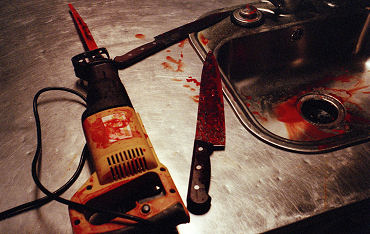
In the best-respected movies about drugs and druggies (Last Days, Requiem for a Dream, Panic in Needle Park, Drugstore Cowboy, Last Train to Brooklyn, The Basketball Diaries), controlled substances always enslave. They rule over values, dignity, common sense, decency — they degrade everything and everyone all to hell. Addicts are criminals, animals, degenerates…and sooner or later they end up screaming in some overlit space — a hallway, an operating room, a police precinct — at some godawful hour.
Cautionary tales, hell — they’re horror movies of a sort. Nobody’s just chipping and everyone’s a victim. Get into it yourself and you’ll be next, see? The only one that doesn’t quite say this is Drugstore Cowboy, but only because it’s in-and-out funny during the first hour.
I’m mentioning all this as a preamble because the reigning Big Kahuna of drug-addict movies is going to pop through theatrically in Los Angeles in early November, and obviously down the road on DVD. It’s not just the longest by virtue of being a three-parter, but is clearly one of the best. Meaning it’s one of the most ghastly and grimly believable.
I’m speaking of Nicolas Winding Refn‘s The Pusher Trilogy (Magnolia), which was first shown on this continent at the 2005 Toronto Film Festival. In its entirety, I mean. And it’s a very high quality ride.
The three Copenhagen-based film were made and released over a span of nine or ten years — the low-budget Pusher in ’96, and the more amply fundedPusher II : With Blood on My Hands and Pusher 3: I’m the Angel of Death in ’04 and ’05, respectively.

It took me a while to finally sit down and watch all three but I was very glad after I did. And I don’t have a favorite installment. They’re all part of a thematic piece that basically says the same thing over and over: if you want to surround yourself with totally unreliable low-lifes who will betray you or fuck you up at the drop of a hat, become a drug user or supplier. Thing is, they’re completely convincing in a verite sense. Nothing feels acted or staged — it’s all completely raw and real-feeling.
Pusher is about a small time dealer Frank (Kim Bodnia) whose life becomes more and more hellish and precarious after he’s burned by a supplier (or is it a buyer? I’ve forgotten) and the vise he’s stuck in gets tighter and tighter..
Pusher 2 is about a totally wretched scumbag named Tonny (Mads Mikkelsen, the villain in the upcoming 007 film Casino Royale) who’s just gotten out of the slammer and trying to get his chaotic life into shape. Sure thing. He’s despised by his druglord dad and most of his family, and discovers also that he’s just become a father. Great. Rarely has the big screen been sullied by such an unmitigated lowlife.
Pusher 3 is about a Copenhagen ganglord Milo (Zlatko Buric) dealing with drug-selling comepetitors as he plans festivities for his daughter’s 25th birthday. A description of this film on theUK DVD box says that “the stress of Milo’s day only serves to emphasise the bleak nature of criminal existance.” Bleak? Milo and a hecnhman wind up having to butcher a guy they’ve killed — chop him up and grind him down like hamburger.
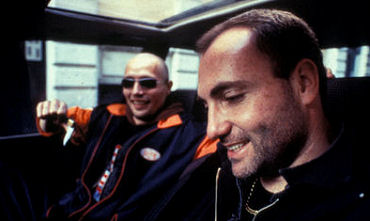
Magnolia Pictures began releasing The Pusher Trilogy in theatres last summer. I don’t know what the DVD plans are, but I’m guessing some kind of ear;y ’07 release.
The Magnolia website says it’s currently playing in Cleveland, Ohio. It will open in Huntington, N.Y. on 10.11, Chicago on 10.20, and in Cambridge’s Brattle Theatre on 11.3 along with the L.A. opening.
Bend beckons
Oregonian critic Shawn Levy delivers on that stand-alone piece about the Bend Film Festival, which kicks off four days from now. As a juror I’ve watched about 20 features and docs plus eight or nine shorts on DVD so far, and I’m still not entirely done. The experience has only reenforced my belief that 90% of everything is crap. Which isn’t “my “belief at all — it’s a famous quote from science-fiction writer Theodore Sturgeon. Okay, let’s re-phrase for sensitivity’s sake: 90% of everything isn’t quite good enough.
Esquire tease
That “Sexist Woman Alive” tease over the last five issues of Esquire, consisting of staffer A.J. Jacobs interviewing “an enigmatic trailer-park temptress” who turned out to be Scarlett Johansson, was one of the boring and infuriating wank-offs in monthly magazine history. I got more and more angry with each new installment, and now that it’s over I feel like throwing the latest issue across the room.
Esquire did the same thing last year with Jessica Biel, fine. Jacobs gives credit to Johansson for coming up with the idea of her portraying a trailer trash girl…brilliant. I hated this idea, hated this idea…hated it. On top of which Johansson has always seemed a tiny bit common. Nothing wrong with obviousness but commonality — i.e, indications of serfs and peons in the family tree — has a way of dimming the candle.
Shortbus shortcomings
“I’m not saying John Cameron Mitchell‘s Shortbus is up there with Citizen Kane or Drunken Master II,” says Richard Corliss in a Time essay called “Meet the F–kers.” “It’s mostly clever, sometimes meandering. And I have to say I didn’t get all that jazzed by the many gay exertions (or the straight ones).”
Really? I thought the sequence with Paul Dawson leaning upside down against a wall and blowing himself was right up there with the Odessa Steps sequence in Sergei Eisenstein‘s Battleship Potemkin.

“But I was, critically speaking, excited to see the coherent integration of explicit sex scenes into a naturalistic story film,” Corliss continues. “Mitchell said that in press interviews here, he was asked over and over, ‘Why sex?’ I wonder: What took so long? Most people laugh and cry; most people have sex, occasionally at the same time. Sex isn’t divorced from our own emotional biographies; it’s an inextricable part of it.
“So I applaud Mitchell. And I say to other intrepid filmmakers: Just do it.” — critic Richard Corliss in his 10.6.06 Time piece called “Meet The F–kers.”
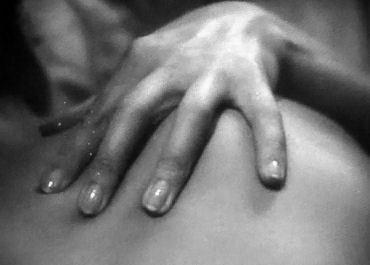
I respect Shortbus also for blending tangible emotional fibre with downtown Manhattan sexuality and hormonal urgency, blah, blah, and I too wish there would be more sexuality and less overt violence in movies, etc. And I laughed at the singing menage a trois scene. But the truth is that I was bored — vaguely bored — during a lot of Shortbus, and moderately repelled by some of the sexual footage.
Repelled partly because of Mitchell’s dp, Frank G. DeMarco, using overly bright lighting on all that white blotchy skin, and partly because I miss the kind of sugggestive, carefully lit scenes of skin and out-front sexuality that were part of Hiroshima Mon Amour , the 1959 Alan Resnias film, and Ingmar Bergman‘s 1963 film The Silence.
I know, I know…get with Mitchell and DeMarco’s blotchy white skin program and get in step with the 2006 program. But I don’t want to live in a cinematic world of shrugs, yawns and popcorn and leg-stretching breaks in the lobby .
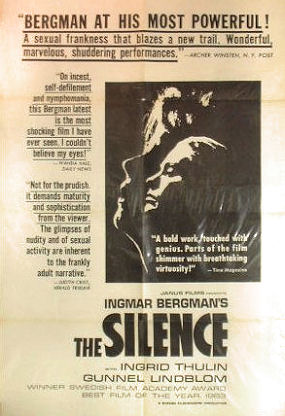
Another “Departed” view
“I saw The Departed last night,” an industry friend wrote this morning. “I recognize the awesomeness of the filmmaking, of course. But I agree with you that it really is about nothing at all. It’s a film without a soul. And the praise it’s gotten makes me wonder how much the aura of a director influences critics. Sometimes it helps and sometimes it hurts.
“Allegiance factors are a big factor with Clint Eastwood these days also. Million Dollar Baby was a lazily directed film. It was all in the screenplay. Casino was not well reviewed, but had it been directed by an unknown, it would have been hailed, perhaps even an Oscar winner.
“On the reverse there’s so much love for Martin Scorsese now. A lot of the fervor for The Departed is actually a celebration of a good-old-days feeling…the Marty they knew and loved many years ago back in the fold. Allegiance factors are a big factor with Eastwood these days also. Million Dollar Baby was a lazily directed film. It was all in the screenplay.”
Clarifying: I didn’t say it’s “about nothing at all” in my original review. I wrote that The Departed “doesn’t exactly throb with thematic weight. It may not be profound or symphonic, but it’s cause for real cheering. Is it as good as Goodfellas? Well, no…but who cares? It’s tight and trim and exciting at every turn. And at least it’s Scorsese back in the groove.”

